- Home
- Jennifer A. Nielsen
Resistance Page 7
Resistance Read online
Page 7
I accidentally bumped into one officer as I was jostled along with the crowds. He was a tall man with dark blond hair and a face that might’ve been handsome if it were not the face of a murderer.
“Sei vorsichtig!” he shouted at me.
I mumbled an apology in his language and moved away with my eyes down. There are several ways to warn someone to be careful in German. The meaning he chose was specific—that it was dangerous to have bumped into him.
I smiled despite myself. Perhaps it was dangerous for him to have bumped into me. My bag was loaded with weapons, and I knew how to use them all. But that wasn’t the purpose for these weapons, nor was this the place where I wanted to make my last stand.
At one time, I would have questioned the wisdom of a public meeting, especially near the heart of where the Germans set up their government. But Akiva had learned that as long as we did nothing to draw attention to ourselves, we were less suspicious meeting beneath the noses of the Germans than in quiet corners on the outskirts of town, where we’d be expected to gather. Where they’d be watching for us.
From a distance, I saw a figure standing near the broken statue, and I blinked a couple of times, certain that could not be my contact. Because even in wartime, facing the extinction of my people, surely fate could not be this cruel. In my mind, I’d felt certain I would see Rubin or Hanusia here, or even someone from another Akiva cell.
Not Esther.
I was glad that she was still alive, of course. I’d be glad for any of us to be alive, but this was different. This was the person with whom I was supposed to complete a mission, a person I had to trust with my life.
That simply wasn’t her. It would never be her.
She approached me as if to offer a hug of greeting, but I stepped back and lowered my eyes. Two seconds into our meeting and she’d already drawn attention our way. We wouldn’t hug or speak in hushed tones with our heads huddled together. We wouldn’t let our eyes dart around as if expecting to be shot at any minute.
She was dressed in slacks and so was I, which could have been better planned. There would be other teens in slacks, of course, but most girls wore dresses, especially those trying to pass themselves off as respectable middle-class Poles.
Looking around at nothing in particular, and certainly not at her, I asked, “You’re here to give me the next assignment?”
She shrugged. “It’s our assignment together.”
Of course it was. I hoisted the bag on my shoulder again, trying not to show how heavy it was. “Which way are we walking?” If she was coming with me, then we wouldn’t talk about the assignment here. I just wanted to get moving.
She was more prepared with an answer than I might have expected. “Train station.”
“Taking the train? No, not there. Not with you.” Even with my Polish looks, it was dangerous to board the train in Krakow. The Gestapo employed Jews to keep watch for other Jews attempting to leave the city, figuring they could better identify one of their own. Their quota was ten Jews per day, and failing to meet the quota could result in their dismissal. Dismissal often ended in the death camps, so they were well motivated to spot us.
Esther shook her head. “I can get through the train station, Chaya. I can.”
We’d see about that. “How far are we going?”
“Lodz.”
I drew in a sharp breath and forced myself to release it without visibly panicking. Our leaders had told us never to go to Lodz. It was particularly dangerous to smuggle anything inside the ghetto there, and even if we were successful, the OD was brutal and the Judenrat was corrupt. Lodz was one of the worst.
“You didn’t get these orders from anyone within Akiva,” I said, my tone accusatory and cold. “Dolek, the Draengers—they always refused us permission to go there.”
“Dolek is dead,” Esther said flatly. “I don’t know how the Gestapo found Akiva’s bunker after Cyganeria, but Dolek and a few others refused to be taken alive. Everyone else at the bunker was either shot on site or arrested.”
I suspected Dolek’s life had ended the way he wanted it to, in a final flash of defiance. But the news settled in me like an unbearable weight. Few men were his equal.
Esther continued, “The Draengers are in Montelupich Prison. Most of the other resistance fighters who survived are there too.”
“Montelupich?” My gut twisted. Montelupich Prison was a terrible place, designed and run by sadists. If the Draengers were there, then they had experienced torture worse than anything I could imagine, and even what I could picture turned my stomach. They would be kept at the edge of death in an attempt to make them talk. But I knew the Draengers. The Nazis would get nothing from them. Shimshon cared more for the resistance than his own life. Gusta was tougher than I ever hoped to be. If anyone could survive the prison, it was them.
Esther gave me a moment to absorb her news, then said, “Antek has picked up the reins for Akiva. He’s hiding in the forest, trying to reorganize the resistance.”
Antek was only a few years older than me but had been high up in Akiva’s organization from our earliest days in the resistance. I didn’t know him well, but if he had taken over, then orders were orders.
I began walking toward the train station with Esther close by my side. We had already been standing still too long, talking for too long. “How can Antek reorganize with only you and me? Are we all that’s left?”
“No, but there aren’t many of us. There are other resistance organizations throughout Poland, though. Antek hopes to start one in Lodz. That’s our job—to get in and determine if there’s any chance to start a group there.”
Feeling the weight of eyes on us, I laughed, as if she’d said something funny. She echoed my laugh, though it was forced and false, and much too loud. If we were going to do this mission together, then I’d train her, just as I’d been trained. I’d already begun making a mental list of things to speak to her about when we were alone.
Don’t walk with your hands in your pockets. It looks like you’re hiding something.
Don’t look down or avoid eye contact or stare.
In short, she shouldn’t do anything that she’d been doing until now. Except that Esther had survived this long, so she must be doing some things right.
“I’ve brought a few weapons,” I said. “But it’s not enough for an uprising in a ghetto as large as the one in Lodz.”
“Maybe it’s enough for a start.”
The walk from Old Town to the train station took only ten minutes, but it was ten minutes of hearing the pounding of my heart and trying to ignore the warning thoughts racing through my head. I often traveled by train to get from one ghetto to another, but I’d traveled alone and I was never comfortable during the journey. Train cars were a space I couldn’t control. What if the wrong person sat near me? What if they were suspicious and contacted one of the German soldiers inevitably riding along? I’d jumped off trains a few times during raids, but here, on a passenger train, that sort of behavior tended to look suspicious.
It was harder now with Esther. Instead of the swept-back style that was the current fashion, she wore her hair around her face, hoping to be less visible. But if anyone did look, they’d surely wonder if she might be Jewish. All I could do was hope that my more Polish looks would direct attention away from her.
Since I was older than Esther, no one would think twice if I managed the money and tickets. I also had a pretty face, another weapon in my arsenal, and whenever necessary, I used it as such. If I was the more exuberant, friendlier one, I hoped that Esther would escape the notice of the other passengers.
At one time, Jews and Poles rode the trains as equals, often side by side. Often as friends. Then, as the laws changed, we were charged more than the Poles for the same seats. Then we were banished altogether. If any other Jews managed to sneak aboard this train, they wouldn’t want contact with me any more than I did with them.
I’d brought with me most of the cash from the safe house, so it
was easy to purchase the tickets. I did leave a little money behind on the slight chance that any other Akiva members returned there, but I saw now that it had been a foolish decision. A pit in my gut became a reminder that nearly all of Akiva was gone. No one would return to that safe house.
“Why are you young ladies going to Lodz today?” The cashier’s friendly tone suggested it was a routine question, but I never took that for granted.
“To visit our grandmother,” I replied.
At the very same time, Esther said, “It’s our home.”
“It will be our home now,” I quickly corrected, giving Esther a small kick to keep her quiet.
Once we were alone, I turned to her and hissed, “From now on, unless the question is specifically directed to you, I will answer. And never tell someone you’re headed home to a place you don’t know. What if he had asked what street you live on? What if he’s from Lodz and asks about your family?”
Her lower lip quivered. “You’re right, Chaya. I’m sorry.”
I wasn’t angry with her, not really. I was angry at myself. I didn’t like me this way, cold and harsh. Before the war, I would’ve taken her hand and told her it doesn’t matter if she makes mistakes—we all do, and it can’t be all that bad.
But this was wartime, and everything mattered. Even small mistakes could be catastrophic.
“Encourage a resistance movement in Lodz, is that all we’re assigned to do?” I asked. She nodded but wouldn’t meet my eyes. She was holding something back.
“What else?” I continued. “Tell me and then you can go. I’ll do it alone.”
My tone was calm, yet she recoiled as if I’d slapped her. “What? No, I’m coming with you.”
“You want to come, but we both know you’re not up to it. There’s no shame in admitting it.”
“I won’t admit it because it’s not true. I can complete this mission.”
“So can I, alone. It’s safer anyway—sometimes the best thing you can do is get out of the way. What were Antek’s exact orders to you?”
She stiffened her spine and pinched her mouth shut, clearly trying to keep her emotions in check. Finally, she answered. “Our orders are to go to the ghetto in Lodz—together—and see if there is any chance for a resistance movement there. You bought two tickets for the train. One of them is for me.”
I groaned and walked with her toward the train platform, carefully looking out for anyone who might be watching us too closely. If anyone seemed like they were, I crossed between them and Esther, blocking their view. Otherwise, we remained separated enough that few people would think of us as traveling companions. I didn’t feel like a companion to her anyway, not when she was withholding information from me.
The biggest problem was that I understood why she was doing it: The fewer people who knew a secret, the fewer who could tell it. We were both safer if she told me only what I needed to know. And that would have been enough … if I trusted her.
Which I didn’t.
“May I help with your bag, miss?” the ticket officer in front of me asked.
I’d shown him my ticket, and all I needed was for him to wave me forward onto the train. Why should he feel the need to have a conversation too? But he did, so I replied as politely as possible.
“Thank you, sir, but I can manage.”
I had to manage, because my bag was hiding three Luger pistols and a pack of bullets. If he lifted it onto the train, he might wonder why it was so heavy—maybe become suspicious. He’d gesture to the Nazi officer at the far end of the platform to come over. Our mission would end before it had begun.
When he reached for the bag anyway, I straightened up and offered a pleasant smile. “Really, sir, I’m fine.”
“Very well,” he said. Friendly. Oblivious. Completely unaware.
A few minutes later, Esther and I boarded the train. She followed me in silence from one compartment to another. I wanted a space that was more full than empty, because I wanted to choose who my compartment mates were rather than have it be chosen for me after I was seated.
We wouldn’t enter the first one, full of Germans, including two women who were chatting about surprising their officer husbands in Lodz. A large Polish man in the second compartment had his eye on me, though I hoped it was because he thought I was pretty and nothing more. The third compartment held an elderly couple, the wife already napping on her husband’s shoulder, and a mother with two young children. They’d keep her too busy to notice us.
I hoped.
I pulled open the compartment door and we went inside. The train was already leaving the station. Whatever happened on this journey, we were committed now. There would be no escape.
February 15, 1943
Train to Lodz
Before we entered the carriage, I’d done a quick survey to find the nearest exit. If there was trouble, our only choice might be to force the doors open and jump, even onto rocks, rather than be captured. I doubted Esther could make herself leap from a moving train.
Which led to a question I had to ask myself: Would I abandon her if that was the only way to save my life?
I felt terrible even considering that, with Esther right next to me. I felt worse, knowing my answer to that question.
She sat near the window, allowing me to occupy the more visible middle seat. A young girl was at my side, only four or five years old. No doubt she’d felt the effects of war, yet she still looked healthy and happy and had a doll that was entertaining her, at least for now. Across from me were the elderly couple, the mother, and a toddler boy who’d nearly pulled the communication cord at least six times already. In this model of train, a tug on that cord automatically triggered the brakes and would guarantee a visit from an angry engineer to see who had interrupted the trip. Most of the time the cords were covered, but this one was exposed. If I’d noticed that before we sat down, we’d have chosen another compartment.
For her part, Esther was doing exactly what she should, or better. She’d already opened a book from her bag, one with a velvet cover that had a gold cross stamped into it. She immediately bent low to read it. I doubted that she cared a single zloty for the book, though its contents might be useful for her one day. More important, her hair fell over her face as she read, and would probably remain that way for the entire trip. No one would get a good look at her, and no one would question why that was. It was clever enough that I wished I had thought of it too.
I passed the trip staring out the window. Although there was wisdom in keeping my face turned from the rest of the passengers, I also genuinely enjoyed the scenery. In one moment, I saw a rolling hillside with the occasional farmhouse, the winter snow finally beginning to melt on the western slopes, looking completely untouched by war. In the next moment, the war returned, with long, jagged scars in the land where a skirmish might have taken place, or a village with Nazi flags, or rows of freshly dug graves. Then the train pushed on and the scene returned to normal again.
I leaned back and closed my eyes, wondering if I survived this war, could I ever return to normal again? Could one go back to who one was in an earlier time? That didn’t seem possible, which saddened me, yet at the same time energized me. I was stronger now than I ever used to be, more independent and confident.
I was also more cynical and detached, I knew that. It was more of what I didn’t like about myself, but it had kept me alive, allowed me to do what I’d had to do. It was why I hadn’t spoken a word to Esther, even though we’d been traveling for over an hour by now. Our complete silence must look unnatural to the other passengers.
Reluctantly, I took a deep breath and leaned over to Esther. “Enjoying the ride?”
She looked up with an arched brow, as if she had no idea I could speak. “Er … yes,” she stammered.
In what appeared to be an attempt at politeness, the older gentleman across from me gestured around our carriage and said, “These rides are better now.”
“Oh?” This ride seemed no different from any ot
her, bumpy and loud, but pleasant nonetheless.
“The trains are Judenfrei now.”
Esther’s head shot up. “Why should that matter?” she asked, clearly offended. “What did the Jews ever do but ride here, same as the others?”
I wanted to kick Esther again, hard enough this time to get her head back down in that book. Aside from the fact that this man would perceive her behavior as being uncommonly rude, I also didn’t like the darkening of his expression as he looked at Esther. Studying her. Suspicious.
Raising his voice, he added, “The Jews are known to carry disease—typhus and lice and who knows what else? Look at the ghettos for proof of that.”
It was true that the ghettos had disease. But we were not the cause of it. No one would be able to live in such close quarters—usually without running water, with no way to rid ourselves of the trash that collected, and with little access to medical care—and not face disease. Disease followed the Jews into the ghettos. We did not bring it.
I smiled, the same smile I wore for the Nazis at the ghetto gates. The same smile that hid the venom pulsing through me. “The trains are less crowded now, that’s true.”
The man paused while the toddler let out a cry, still upset that his mother wouldn’t let him reach for the cord, then said, “Poland is less crowded now. Before long, the Jewish problem will be solved for good.”
Beside me, Esther had a white-knuckle grip on her book. She needed to ignore him, or to at least pretend that this conversation held no interest for her.
Desperate for any distraction from managing her children—the boy, who was reaching for the communication cord for at least the thirtieth time that hour, and the girl, who had begun repeatedly throwing her doll on the floor to have an excuse to climb down and pick it up—the mother cut in, saying, “There is no Jewish problem. The problem is with the rest of us who pass beside the ghetto walls with a fresh loaf of bread, knowing the people are starving on the other side, and yet we do nothing.” She sat taller. “I throw the loaf over whenever it’s safe and pray that it gets found. I pray for those people every day, and so should you. What is happening to the Jews is pure evil.”

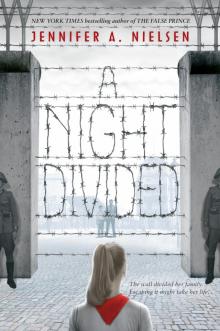 A Night Divided
A Night Divided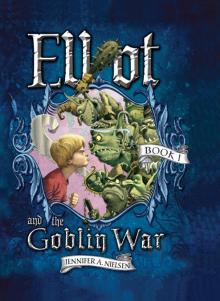 Elliot and the Goblin War
Elliot and the Goblin War Elliot and the Last Underworld War
Elliot and the Last Underworld War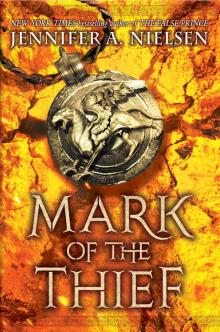 Mark of the Thief
Mark of the Thief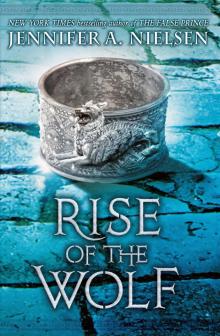 Rise of the Wolf
Rise of the Wolf Elliot and the Pixie Plot
Elliot and the Pixie Plot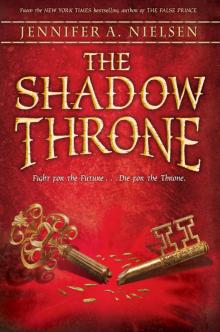 The Shadow Throne
The Shadow Throne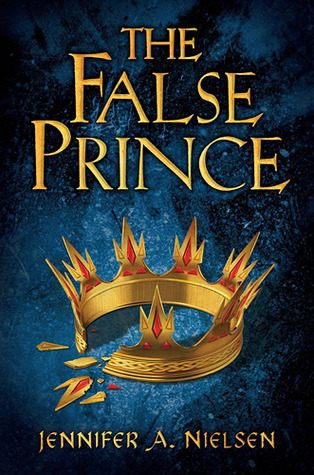 The False Prince
The False Prince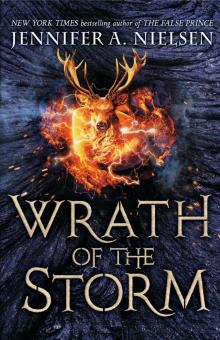 Wrath of the Storm
Wrath of the Storm Deadzone
Deadzone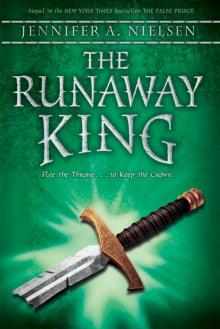 The Runaway King
The Runaway King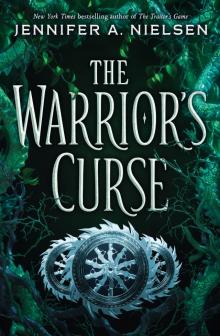 The Warrior's Curse
The Warrior's Curse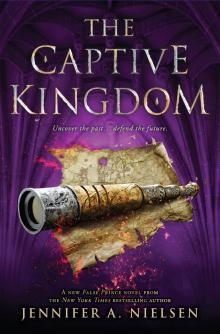 The Captive Kingdom
The Captive Kingdom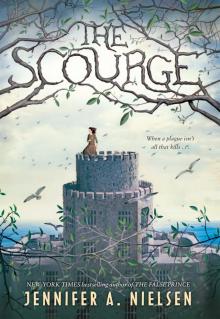 The Scourge
The Scourge The Deceiver's Heart
The Deceiver's Heart Resistance
Resistance